On a rainy Saturday evening earlier this month in Pierrefitte-sur-Seine, a Paris suburb located about ten kilometres north of the French capital, a giant menorah was being erected by a small group of inhabitants on the small square just outside the Town Hall to celebrate Hanukah, the yearly Jewish “festival of lights”.
Inside the building, another group – young girls in long skirts and padded winter jackets, boys dressed in white shirts and black hats – were busy helping to set the scene. Ahead of the arrival of around 50 guests, a family was placing tables, ovens and a popcorn machine.
“We celebrate Hanukah here every year, and we light the menorah outside because the light must shine as far as possible,” said Haim Lumbroso, 37, a prominent member of the local Jewish community, in charge of the organisation. Lumbroso is Chabad rabbi, belonging to the Orthodox Hasidic movement which counts around 35,000 followers in France,
But the event was far from austere. Most of those taking part were Jewish, but not all Orthodox, biting on pancakes, waffles and kosher sweet dishes to a background of religious songs in Hebrew. Some of them were from nearby towns of Sarcelles and Saint-Denis.
Outside, the socialist mayor of Pierrefitte, Michel Fourcade, climbed a ladder alongside rabbi Lumbroso to light one of the branches of the light stand. “I am for secularity, but I am also for allowing each person to have a religion and that each person respects that religion,” said Fourcade. “For us, that [also] means going to the gymnasiums opened by the town for Muslim prayers. Today it is about using the Town Hall square and, if it’s raining, allowing our fellow citizens to shelter themselves.”
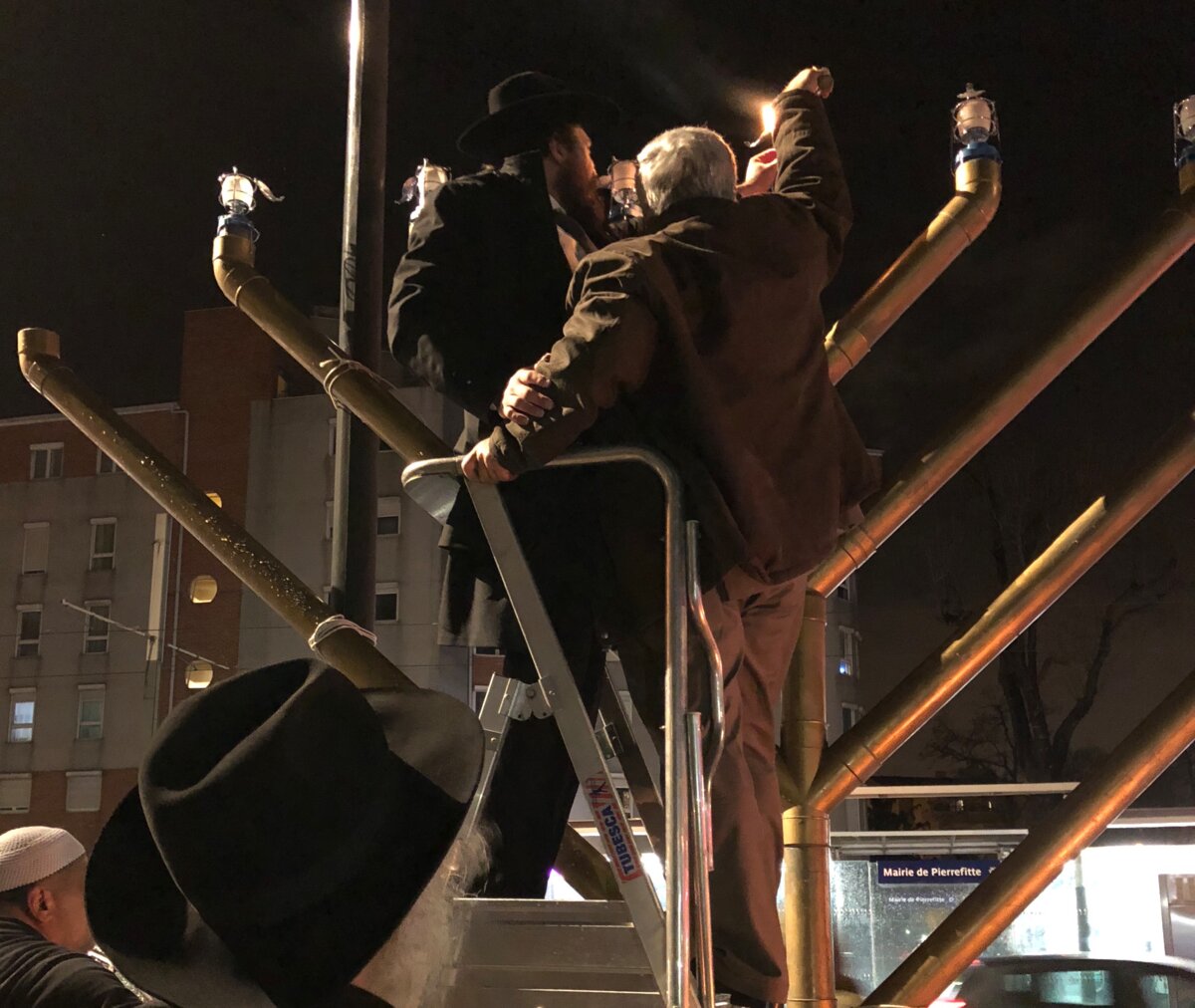
Enlargement : Illustration 1

Across the Seine-Saint-Denis département (the name for France’s administrative regions, equivalent to a county) in which Pierrefitte sits, similar celebrations were held in neighbouring towns including Aubervilliers, La Courneuve, Pantin, Les Lilas and Les Pavillons-sous-Bois. For Martine Cohen, a sociologist and specialist in Judaism with the French national scientific research centre, the CNRS, the celebrations, held by the Chabad since the 1970s, in an atmosphere that combines both openness and conservatism, are part of a “proselytising mission towards Jews which has led the Chabad community to accept compromises and arrangements in order to reach out to the most reticent”.
Alongside Mayor Michel Fourcade was his deputy, Ammar Rahouani, who is also a spokesman for the Association of Pierrefitte Muslims, whose presence that night was as representative for the local imam. “We are here to wish the Jewish community a happy celebration, and to tell it that we’re at their side, in peace and serenity,” he said. Rabbi Lumbroso said he also joined in events organised by the Muslim community.
Jessica (last name withheld), 36, a member of the Jewish community, has spent her whole life in Seine-Saint-Denis, whose population of around 1.6 million is one of the most ethnically diverse of any French département. “I’ve never felt anxiety here,” she said, interviewed as she stepped out of a kosher butcher’s store in Les Lilas, which borders the Paris ringroad. “I have friends from all the communities. I don’t believe I’m an exception. For example, I try to celebrate Shabbats with non-Jews. I keep being told that that is forbidden, but I love doing that! I think people are afraid of the Jewish community because they don’t know it. Solutions need to be found for people to learn to get know each other.”
Today, the Jewish consistory of Paris lists 41 synagogues across Seine-Saint-Denis, which includes both those that the consistory funds and whose rabbis it trains, and also those which are independent, like the ones run by the Chabad. Several towns have more than one synagogue, as is the case in Les Lilas.
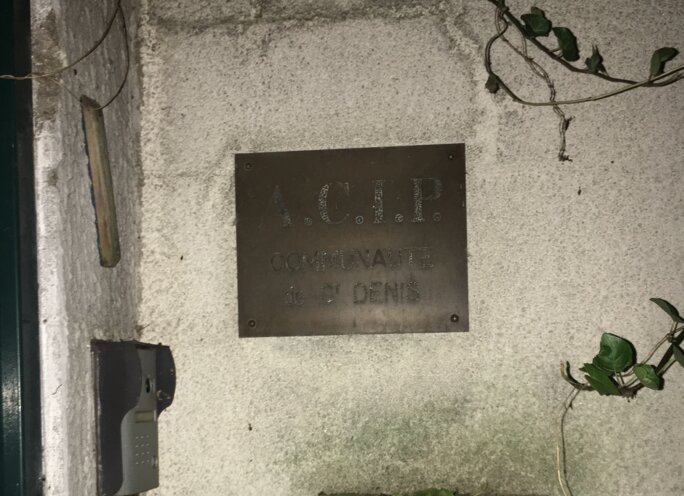
Enlargement : Illustration 2

In the town of Saint-Denis (which lends its name to the département), one of the two synagogues listed by the consistory is now closed. The other, which is housed in the nearby “Ohr Menahem” Chabad community centre “welcomes Jews of all tendencies” said its rabbi, Mendel Belinow. It shares the community centre with the headquarters of an organisation dedicated to the welfare of autistic children. Its administrative director, Marcel Moché Lewin, says he works in close collaboration with professionals of all faiths. “I find it’s idiotic to shut oneself up within one sector or religion,” he said. “We are all the same. We have two eyes and two hands. You should remain serene and honest. If one doesn’t open up oneself, there is no inter-understanding. You don’t progress. It is important to see everything, not only throughout a life, but even in one day.”
Daoud Tatou is a former president of the Saint-Denis mosque and is now director of an association, called Le Relais, which provides practical help to autistic adults and teenagers. He and Benhamou together lead joint religious projects and debates about the problems autistic people face. “When the synagogue was attacked with a petrol bomb in January 2009, we came to demonstrate our solidarity and our indignation,” said Tatou. “We want to undo this image that says Jews cannot live with Arabs and Muslims, it’s totally false.”
'It’s the same everywhere, we don’t feel in safety'
According to the French authorities, there has been no recent rise in anti-Semitic attacks in Seine-Saint-Denis, and that those that have occurred over the recent period correspond to the average of those recorded in Paris and its immediate surrounding suburbs.
Nevertheless, the figures on anti-Semitic attacks released by the French interior ministry in November 2018 are alarming, showing a nationwide year-on-year rise of 69%. That compares with a fall in the numbers of such attacks over the two preceding years. That period corresponded with the deployment of armed troops in front of Jewish schools and religious centres launched after the terrorist attacks in January 2015 when, days after the attack on the Paris offices of Charlie Hebdo magazine, which left 12 dead, a kosher supermarket close to Paris was also attacked when four hostages were murdered.
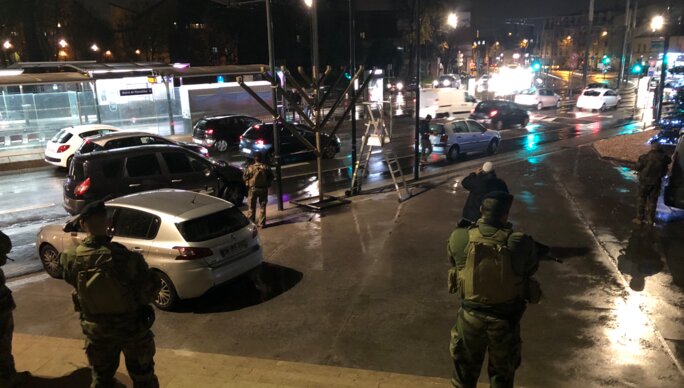
Enlargement : Illustration 3

In a report on anti-Semitic attacks in France in 2017, the Protection Service for the Jewish Community (SPCJ), a body created by the Representative Council of Jewish Institutions in France (CRIF), found most occurred in the city of Paris (15), with the Seine-Saint-Denis in second place with 12. The Val-de-Marne département south-east of Paris was in third place with 10 recorded incidents.
Johanna Barasz, a deputy director of the French government’s “inter-ministerial delegation for the fight against racism, anti-Semitism and anti-LGBT hate”, the Dilcrah, the records of such crimes are an underestimation. “The numbers of complaints and recorded acts correspond little or poorly with what we can hear in investigations into victimisation or the [expressed] feeling of insecurity,” she said.
Militaires devant la mairie de Pierrefitte lors de la célébration de Hanouka. © Sarah Smaïl/Bondy Blog
“The sentiment of danger for Jews is also part of the reality”, says sociologist Martine Cohen. “I consider that this should be taken into consideration, even when it’s not directly linked to the statistics. The situation is neither completely black, nor completely white.”
According to France’s National Consultative Commission on Human Rights (CNCDH), the Israeli-Palestinian conflict is an ‘imported’ element that fuels tensions. In a report it published in 2017, the CNCDH observed a rise in anti-Semitic attacks in France during moments of heightened conflict in the Middle East. “There is a temptation on the part of Jews to see themselves as Israeli, and for Arabs to take themselves for Palestinians,” commented Sacha Ghozlan, president of the Union of Jewish Students in France (UEJF). “It is important to explain that it is possible to give place for a bit of distance.” Contacted for this report, France’s International League against Racism and anti-Semitism, the LICRA, did not respond to our questions.
A number of Jews, like Alexandre Sebag, a factory worker in the Seine-Saint-Denis town of Montreuil, admit to hiding their religious identity in public. He wears a baseball cap instead of a kippa, because “you never know who you might come across”. Max, a 66-year-old resident of Bondy, further north, speaking one Saturday morning outside a synagogue in nearby Bobigny, observed that, “When you are a Jew in Seine-Saint-Denis you can’t go on about it too much, we’re a minority”. Both men say they personally have never encountered a problem, but they felt the need to take precautions.
The sentiment of insecurity is a recurrent theme among those Jews in the département who were questioned for this report. That feeling has been exacerbated by the numerous attacks on Jews in recent years. The most shocking of these include the kidnap, torture and murder of 24-year-old Ilan Halimi; the murder of Sarah Halimi, 65, in April 2017 and the murder of Mireille Knoll, 85, in March 2018. The macabre list also includes the victims of 24-year-old Toulouse Jihadist gunman Mohamed Merah's attacks in March 2012 who shot dead rabbi Jonathan Sandler 30, along with his two children Gabriel, 4 , and Aryeh, 5, and also another Jewish child Myriam Monsonégo, 7, outside the Ozar Hatorah Jewish school in the city in south-west France (Merah also murdered three French soldiers of North African family origin). In January 2015, an attack on a kosher supermarket in Vincennes, on the south-east corner of Paris, by gunman Amedy Coulibaly, a convicted delinquent who claimed to be acting in the name of the so-called Islamic State group, left four Jewish hostages dead; Philippe Braham, 45, Yohan Cohen, 21, Yoav Hattab, 2, and François-Michel Saada, 64.
Leaning against his bicycle in front of the “hypercacher” kosher supermarket in Montreuil, a north-east Paris suburb, senior nurse Sébastien Roggia spoke of his anger at being the target of recurrent anti-Semitic comments. Roggia, 36, regularly takes part in ceremonies at more liberal Parisian synagogues unaffiliated to the Paris Jewish consistory. He moved to the capital one year ago from Lyon, France’s second-largest city, where he was employed by a local association (the details of which are withheld here). “My colleagues, mostly Christian Evangelists, were constantly making comments about me,” he said. “I was their boss ‘because I was Jewish’, my ten-year-old Audi proved that I was well-off. I was even asked if in order to shop at the Hypercacher you needed a membership card. What kind of card? Why not a yellow star? But this happens even elsewhere. Recently I called on the services of an electrician. He was like blocked by the mezuzah at the entrance of my apartment and refused to enter my home! So I called up someone from the community.” Roggia said he plans to set up a business with a girlfriend, and had thought of opening a kosher greengrocer store but finally dropped the idea: “If it’s so that it gets smashed up, it’s not worth it.”
Avi Lahiany, a large and genial character, runs an IT business in the Seine-Saint-Denis town of Bobigny. “Some people believe that we [Jews] are particularly helped by the State, whereas we have no privilege, we work hard,” he said. “And there are some young folk who have learned to not like Jews, without knowing why, by imitation or a lack of information. But it’s the same everywhere, we don’t feel we are in safety. The problem is with the extremists of all kinds.”
For Nonna Mayer, a senior research director with the CNRS and a project director with the Paris political sciences school Sciences Po, “Among opinions, the most resonant is the old anti-Semitism that associates Jews with money and power”. Mayer, who was previously a member of France’s National Consultative Commission on Human Rights, said of this notion that, “the more one is politically on the Right, the stronger it is”.
'I found it very difficult to leave, I had been fine'
Jewish parents in Seine-Saint-Denis are increasingly sending their children to private Jewish schools to protect them from anti-Semitic insults and assaults. “Before, it was children from practicing families who went to Jewish schools,” said Moché Lewin, 51, a rabbi in the Seine-Saint-Denis town of Raincy, a special advisor to the ‘Grand Rabbi’ of France. “Now, parents send their children to Jewish schools to protect them.
In the nearby town of Aubervilliers, the private Jewish school Chné-Or, founded 50 years ago, now has a total of about 800 pupils, from infant level right through to the completion of secondary schooling. The school is a Chabad institution, but the rising admissions include children from parents who are far from practising Jews. Its management says that over the past five years, the numbers of enrolments have climbed by 30%, compared with a progression of between 5%-10% over the preceding five years.
“We have more and more requests from Jewish parents who are distanced from the religion and who hardly know what the Shabbat is,” said Mouchta Tewel, the granddaughter of the school’s founder, Chalom Mendel Kalmenson, and who is in charge of public relations for the establishment. “Some call us even in the middle of the year because their children suffer insults or threats at [state] school. They even tell us that the school heads tell them that they can’t help and recommend them toi go to the Jewish school.”
In face of the rising demand for enrolment, the Chné-Or school, which is financed by foundations and personal donations, has hired extra staff and is trying to find further annexe buildings to meet the rise in class numbers.
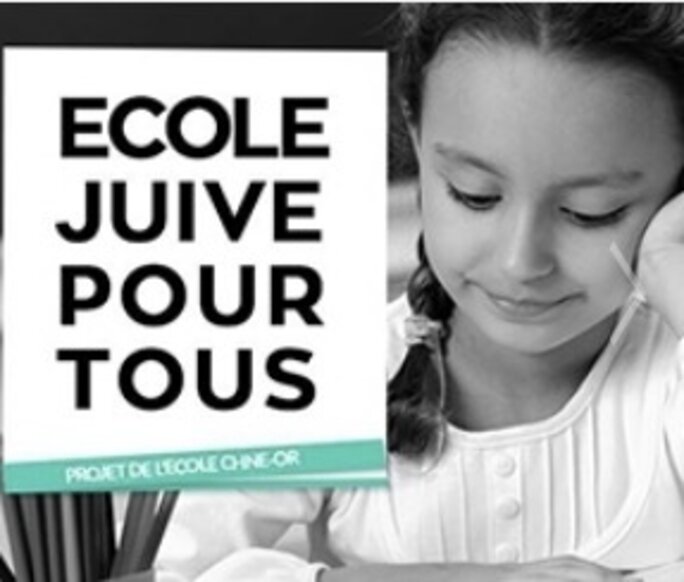
The rise in demand has been a steady process over the past ten years. Seven years ago, the establishment launched an operation called “École juive pour tous” (Jewish schools for all), which organised 24 bus links to bring pupils to the Chné-Or, and has adapted the fees according to the means of parents. Haya Nisilevitch, the head of the school and daughter of its founder, says that about 70% of the school’s pupils need material and financial aide to complete their studies. “Of around 800 pupils, about 350 come by coach, and 300 of them come from other towns [in Seine-Saint-Denis] like Saint-Denis, La Courneuve or Le Raincy, but also from further afield in the Paris region, like Créteil, Sarcelles, Cergy, Houilles.”
Nisilevitch says that parents become anxious with each report of an anti-Semitic attack or threat. The school has a special high-security entrance and the presence of a security guard on the premises 24 hours every day.
In the town of La Courneuve, in the north of the département, the Town Hall admitted that “few children from the Jewish community” attend the local state schools, adding that “parents in general turn towards private education in Aubervilliers”, the location of the Chné-Or school.
The head of another private Jewish school in Seine-Saint-Denis, who asked for her name and that of her school to be withheld, said she was concerned about the flight of pupils. “The worst is anti-Semitism in places where there are no longer any Jews,” she said. “Because then, the Jew becomes a fantasy, and this vacuum is fearful.”
How many Jewish people have moved out of Seine-Saint-Denis, and where is it they have moved to? In France, collecting statistics regarding ethnic or religious origins is illegal – the subject is regarded as taboo by principles of secularity and conformity to a uniform “republican” equality – and it is only through anecdotal observations by representatives of the Jewish communities that one can attempt to pierce the question. “We see the communities diminish,” said Raincy town rabbi Moché Lewin. “Twenty years ago, there were rabbis in exercise at Saint-Denis or Aulnay-sous-Bois, when 100, or 150 people were present at ceremonies on the Saturday. Today, synagogues are closing down, like at Clichy-sous-Bois, or they only open for Yom Kippur.”
According to rabbi Lumbroso, there are only around 50 people of Jewish faith remaining in Pierrefitte-sur-Seine, and Rabbi Jean-Claude Sebag, from the consistorial synagogue in Les Lilas, also confirms the diminishing numbers of the local practising Jews.
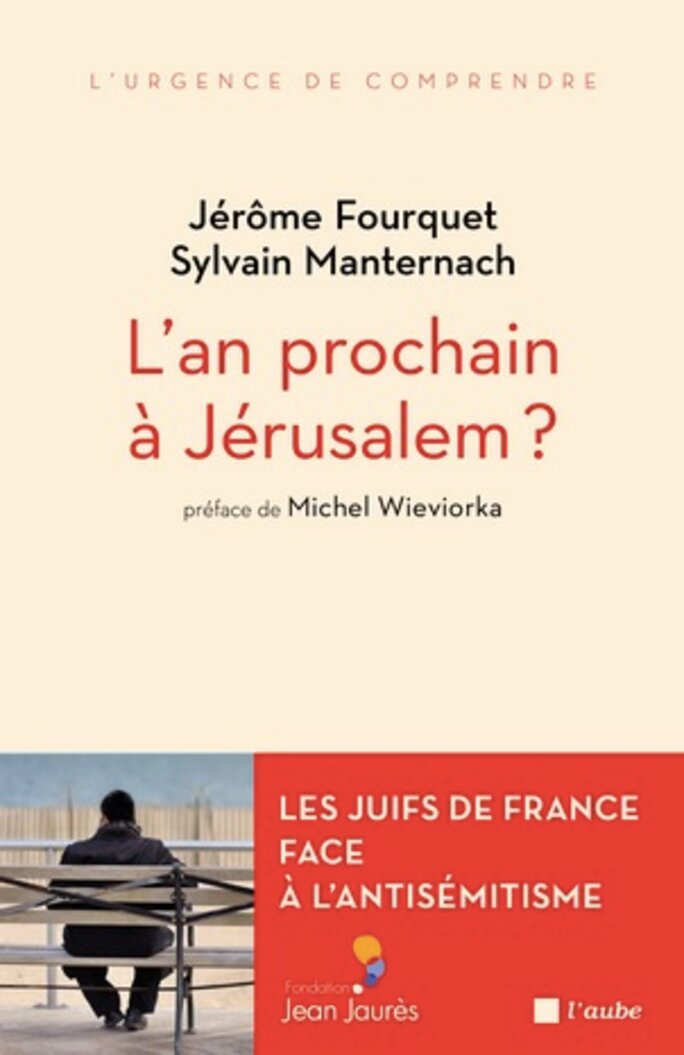
In their co-written 2016 study of the problems of anti-Semitism in France, L’An prochain à Jérusalem (Next Year in Jerusalem), Jérôme Fourquet, a director with French opinion survey firm IFOP, and geographer Sylvain Manternach, using information provided by Jewish associations (because no official figures are available), found that the Jewish community had clearly declined in Seine-Saint-Denis over the 15-year period 2000-2015. They concluded that the number of Jewish families – that is, those known to associations and synagogues, and therefore not representative of the Jewish community as a whole – living in the town of Aulnay-sous-Bois had fallen from 600 to 100, in that of Blanc-Mesnil from 300 to 100, in Clichy-sous-Bois from 400 to 80 and in La Courneuve from 300 to 80.
There has been a relocation trend towards Paris, and the capital’s 17th arrondissement in particular, the town of Sarcelles (nicknamed “Little Jerusalem”) in the neighbouring Val-d’Oise département, but also towards other towns in Seine-Saint-Denis like Villemomble and Raincy. Rabbi Moché Lewin, from Raincy, says the consistorial synagogue there is attended by around 300 people on Saturday mornings. “The community here is sort of preserved,” he said.
Lewin is among those who believe there is a future within the département, and notably by investing in education. The rabbi runs an association called “l’Union pour le dialogue, le partage et la paix 93” (Union for dialogue, sharing and peace 93) – “93” being the administrative number of the département – which he cofounded in 2005. He regularly visits schools in the company of a Catholic priest, a Protestant pastor and a Muslim imam, with the aim of directly informing children about the nature of the four religions, as a more instructive alternative to sources like the internet.
We accompanied him on one such visit, to a class of 16-17-year-olds at the Blanche-de-Castille private Catholic school in Villemomble. Imam Lahcene Lablack from Clichy-sous-Bois was due to attend “but he was held back by his work” explained Lewin. The pupils listened attentively to the rabbi, local priest Laurent Gizard and pastor Serge Wüthrich from the united Protestant church in Raincy, timidly asked questions like, “what is the Sabbath?”. Lewin expressed his regret however that the visits are “confined to private establishments” instead of also including state-run, secular schools.
But moving out of Seine-Saint-Denis can be motivated by other reasons also; the département suffers from significant social inequalities, with the inevitable effects on educational standards and economic life. According to figures released by the French national statistics office, INSEE, in 2015, an average of 29% of the population in Seine-Saint-Denis live below the poverty line – a figure that reaches between 35% and 40% in the specific populations of its towns like Saint-Denis, La Courneuve and Stains.
“The social reasons behind these relocations are, on the one hand, worries [about anti-Semitism], but also reasons that are similar to those of all upwardly mobile social categories, wanting to leave places marked by poverty,” argued sociologist Martine Cohen. “For those who can, these relocations also follow a more general movement in French society, that of creating areas of common economic and cultural environments.”
Marcel Benhamou, administrative director of the organisation catering for autistic children based at the “Ohr Menahem” Chabad community centre in Saint-Denis, now has a home in Paris after living 22 years in the town. “I began to feel I’d had enough, there was shouting in the street, I used to see drugs changing hands,” he explained. “I didn’t really feel safe anymore […] We close the doors on these youths, but they must be given the chance to progress. I found it very difficult to leave, I had been fine, but in Saint-Denis the community was scattered. I was the only Jew among my neighbours, I felt a bit lost. In Paris we are more numerous, we feel safer. It’s a pity because that also creates a ghetto. I prefer it when there’s a mix of Jewish, Muslims and Christian communities. The younger ones leave, the older ones stay; it’s more difficult for them to change.”
Max, 66, interviewed outside the synagogue in Bobigny, was adamant: “I’m staying. France is my country.”
-------------------------
- The French version of this report can be found here.


